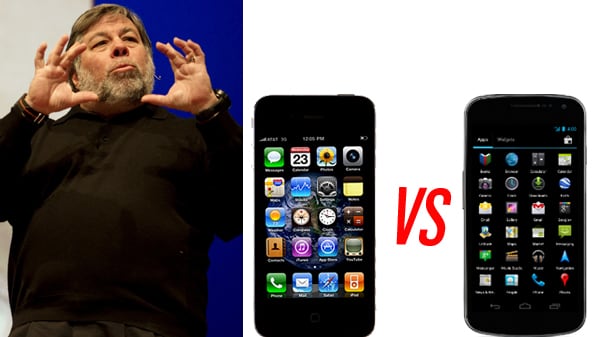Apple CEO Steve Jobs hated the Android smartphone operating system so much that he vowed he would spend his last dying breath and every penny Apple had in the bank trying to destroy it. Android, created by Google, entered the market after Apple but soon gained greater market share. A lot of Apple fans dismiss Android as a ripoff of Apple’s ideas, and a crappy one at that.
But oddly enough, Steve Wozniak, who co-founded Apple with Jobs in 1976, says he’s a big fan of Android phones. Woz says he still thinks Apple’s iPhone is the best overall smartphone, but he says there are ways in which Android has leapt ahead of Apple.
“My primary phone is the iPhone,” Woz says. “I love the beauty of it. But I wish it did all the things my Android does, I really do.”
Woz says voice commands work better on Android. Android’s built-in navigation system, where the phone acts like a GPS system, is another advantage, he says.
Android phones aren’t as simple to use as the iPhone, but they’re not that much more complicated, and “if you’re willing to do the work to understand it a little bit, well I hate to say it, but there’s more available in some ways,” Woz says.
Woz caused a stir recently when he showed up on the Google campus to pick up a pre-release version of Google’s latest flagship phone, the Galaxy Nexus, and had his picture taken with a bunch of Googlers outside the Android development building.

As it turns out, Woz wasn’t crazy about the Galaxy Nexus—he likes the Motorola Droid Razr better—but unlike a lot of Apple bloggers and fans, Woz harbors no ill will toward Google and the Android development team.
He and Andy Rubin, the head of the Android project, are old friends. Woz was on the board of Rubin’s previous company, Danger, which made a smartphone called the Sidekick. “I’ve known Andy a long time, and I respect him a lot,” Woz says.
There’s a theory that Android could do to iOS (Apple’s mobile operating system) what Microsoft Windows did to the Macintosh in the 1990s. Microsoft triumphed because it licensed its software to many different hardware makers and ultimately had much greater market share than Apple, which would only sell its operating system on its own hardware.
In the mobile space, Apple is using the same playbook, tying its software tightly to its own hardware. And with Android, Apple is facing the same kind of foe that it once faced in Windows. “I can see the similarity,” Woz says.
Worse yet, this time, he says, Apple is up against a stronger competitor, since in his mind Windows was never a very good program, while Android actually is. “There’s not as big a difference [between iOS and Android] as there was between Mac and Windows,” he says.
The other difference involves applications. It took a long time before applications looked as good on Windows as they did on the Mac. But with Android, that’s not the case. In fact, in some ways Android might have an edge.
Woz says he recently spoke to a developer at Foursquare who said Apple’s bureaucratic approval process slows app developers down, whereas on Android, developers can get programs out faster and work on making tweaks and revisions in less time.
Then there’s Siri, Apple’s new voice-recognition software. Woz says he’s been using Siri for a long time and used to love it when it was an independent application created for the iPhone.
But ever since Apple bought Siri and built the software into the iPhone 4S, it doesn’t work as well as it used to.
“I used to ask Siri, ‘What are the five biggest lakes in California?’ and it would come back with the answer. Now it just misses. It gives me real estate listings. I used to ask, ‘What are the prime numbers greater than 87?’ and it would answer. Now instead of getting prime numbers, I get listings for prime rib, or prime real estate,” Woz says.
Worse, a lot of the time Siri says it can’t make a connection to the back-end servers that power the system. “With the iPhone 4 I could press a button and call my wife. Now on the 4S I can only do that when Siri can connect over the Internet. But many times it can’t connect. I’ve never had Android come back and say, ‘I can’t connect over the Internet.’”
The Android system also delivers better results, he says. “I have a lower success rate with Siri than I do with the voice built into the Android, and that bothers me,” Woz says. “I’ll be saying, over and over again in my car, ‘Call the Lark Creek Steak House,’ and I can’t get it done. Then I pick up my Android, say the same thing, and it’s done. Plus I get navigation. Android is way ahead on that.”
Another gripe involves battery life. “With the iPhone, something happened with the new OS or the new phone, and it just started running through the battery so fast,” he says. “I’ve had a lot of issues with things I have to turn off just to save the battery life.”
All this criticism might sound strange coming from the patron saint of the Macintosh cult, a revered figure who gets mobbed whenever he shows up at an Apple store.
But Woz says he still recommends the iPhone as the best choice for most users. “The people I recommend the iPhone 4S for are the ones who are already in the Mac world, because it’s so compatible, and people who are just scared of computers altogether and don’t want to use them. The iPhone is the least frightening thing. For that kind of person who is scared of complexity, well, here’s a phone that is simple to use and does what you need it to do,” he says.
The good news, for Apple, is that those kind of people represent the majority of people on the planet. The bad news is that Android appears to be a serious competitor, and one that isn’t going away anytime soon.





